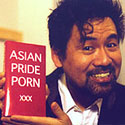|
Directed by: Seijun Suzuki Starring: Makiko Esumi, Sayoko Yamaguchi, Mikijiro Hira If you donít know who Seijun Suzuki is, you might want to look him up before seeing this movie. The film is pretty cryptic on its own, and what measure of meaning and enjoyment can be found from it stems largely from the viewerís familiarity with Suzukiís style and career (and their ability to enjoy that style). This is actually something of a comeback vehicle for Suzuki, who was essentially blacklisted out of the Japanese film industry by the now defunct Nikkatsu studio after he made Branded to Kill (1967), which was seen as nonsensical and unmarketable at the time, though it has grown into a cult classic since then and Suzuki has garnered a loyal following as his work has been rediscovered by younger generations. Pistol Opera is sort of a sequel/remake of Branded to Kill. The main character, No. 3 Killer, Stray Cat, takes the place of Jo Shisidoís character as a hired killer caught up in a web of assassination and intrigue. She is given an assignment by her guild contact to take out the number 1 and 2 killers, One Hundred Eyes and Useless Man. Unfortunately, before she can even begin, Useless Man is found dead, presumably killed by One Hundred Eyes. An ex-killer, The Champ (the No. 3 Killer from Branded to Kill) tells Stray Cat that something is up in the assassins guild, and that someone is purposefully setting the killers against one another. From there, Stray Cat and One Hundred Eyes stalk one another, leading up to the inevitable showdown. This is an overwhelmingly stylish film, even more colorful and pop-art in tone than Branded to Kill or Tokyo Drifter combined (which is what the film is essentially, a combination of Suzukiís favorite elements of those films). The colors are bold and sharp, mixing a comic book with Kabuki theatre to create a sort of living cartoon. The soundtrack features swinging lounge lizard pop-rock and cool rhythms, backing up the candy coated visuals with a similarly artificial quality. Whether or not you will find this blindingly obnoxious or unbearably cool depends on your enjoyment of Suzukiís old works, which the film draws a lot of its energy from. Thereís a surprising amount of self-referencing at work, and itís almost as if Suzuki is reveling in his at-long-last vindication over the naysayers at Nikkatsu, with the freedom to push all of the boundaries now within his grasp. One of the greatest differences between Pistol Opera and Branded to Kill is that in this film, quite a bit of information about the assassins guild is revealed to the audience, whereas in Branded to Kill, next to nothing was known aside from the ranking system and the ďkill or be killedĒ stipulation for each mission. An agent delivers assignments to the killers from the guild, also providing them with weapons, which they are not allowed to keep on their own. In addition, quite a few of the guildís killers are featured in the movie, and a bit of history of the organization is established with the character of the Champ. Another difference is that there is quite a bit of political content in this film. Most of it is surrounding the Westernization of Japan, and the feeling for the need to preserve the countyís own identity. It becomes somewhat preachy at times, but given Suzukiís identity as a uniquely ďJapaneseĒ filmmaker, it isnít all that surprising that he would feel this way. The film has a confusing attitude towards men as well. If it were made by a woman filmmaker, I could possibly see it as anti-male, but as it is, I donít really know what to make of it. The film really wanders a bit at times, and parts of it are all but inaccessible, but I still found myself enjoying it a lot. Maybe Iím too loyal to Suzuki, but I thought this was a really exciting film despite its flaws. Itís definitely unlike anything else being made today, and it has a great sense of nostalgia, even if itís really just Suzuki praising himself. RATING: 4.0 PROS: colorful, stylish, nostalgia CONS: style over substance ADDITIONAL INFORMATION: http://www.imdb.com/title/tt0285906/
|
|
|
|

|
| # ? Apr 25, 2024 10:55 |
|
I went into PO blind, all I knew was that it was supposed to the better than KBvII and that ti was Japanese. I've liked almost all of the Japanese films I've seen so I went into it. Immediately on the start of the film you're hit with vibrant colors and crazy action. It reminds me what I like about japanese films, they're loving crazy when it comes to things. They don't go for the plots we're used to, they go on bizarre plots. From the shoot out with the wheelchair guy this film just get s weirder and weirder. On the downside, it gets a tad bit slow in the middle and the plot gets too complicated. The ending makes very little sense too. However, it's a beautifully shot thrill ride from start to stop. 4
|
|
|
|
Beautiful, but incomprehensible. 4/5
|
|
|
|
An excellent comeback for Suzuki, but not quite good enough on its own to take down any of his previous Top 3; those being Branded to Kill, Tokyo Drifter and Tattooed Life. 4 / 5
|
|
|
|
I really hated it. 1/5
|
|
|









